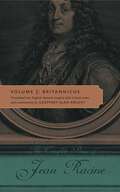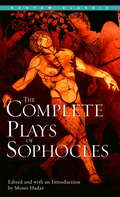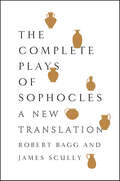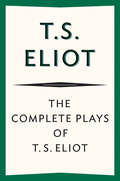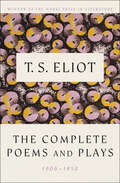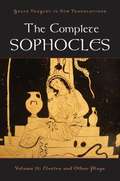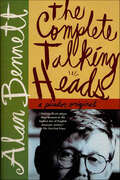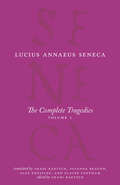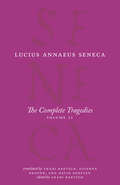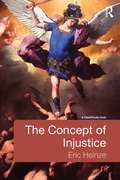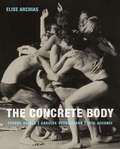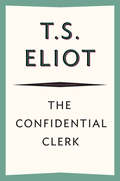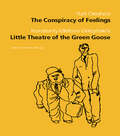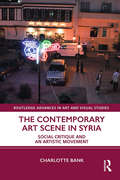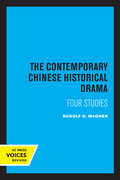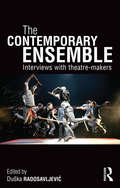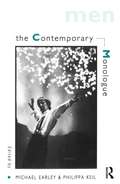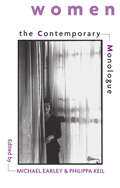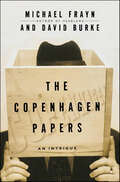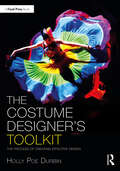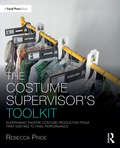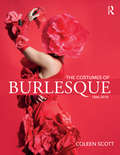- Table View
- List View
The Complete Plays of Jean Racine: Volume 5: Britannicus
by Jean RacineThis is the fifth volume of a projected translation into English of all twelve of Jean Racine’s plays. Geoffrey Alan Argent’s translations faithfully convey all the urgency and keen psychological insight of Racine’s dramas, and the coiled strength of his verse, while breathing new vigor into the time-honored form of the “heroic” couplet. Complementing this translation are the Discussion and the Notes and Commentary—particularly detailed and extensive for this volume, Britannicus being by far Racine’s most historically informed play. Also noteworthy is Argent’s reinstatement of an eighty-two-line scene, originally intended to open Act III, that has never before appeared in an English translation of this play. Britannicus, one of Racine’s greatest plays, dramatizes the crucial day when Nero—son of Agrippina and stepson of the late emperor Claudius—overcomes his mother, his wife Octavia, his tutors, and his vaunted “three virtuous years” in order to announce his omnipotence. He callously murders his innocent stepbrother, Britannicus, and effectively destroys Britannicus’s beloved, the virtuous Junia, as well. Racine may claim, in his first preface, that this tragedy “does not concern itself at all with affairs of the world at large,” but nothing could be further from the truth. The tragedy represented in Britannicus is precisely that of the Roman Empire, for in Nero Racine has created a character who embodies the most infamous qualities of that empire — its cruelty, its depravity, and its refined barbarity.
The Complete Plays of Jean Racine: Volume 5: Britannicus (G - Reference, Information and Interdisciplinary Subjects)
by Jean Racine Geoffrey Alan ArgentThis is the fifth volume of a projected translation into English of all twelve of Jean Racine’s plays. Geoffrey Alan Argent’s translations faithfully convey all the urgency and keen psychological insight of Racine’s dramas, and the coiled strength of his verse, while breathing new vigor into the time-honored form of the “heroic” couplet. Complementing this translation are the Discussion and the Notes and Commentary—particularly detailed and extensive for this volume, Britannicus being by far Racine’s most historically informed play. Also noteworthy is Argent’s reinstatement of an eighty-two-line scene, originally intended to open Act III, that has never before appeared in an English translation of this play. Britannicus, one of Racine’s greatest plays, dramatizes the crucial day when Nero—son of Agrippina and stepson of the late emperor Claudius—overcomes his mother, his wife Octavia, his tutors, and his vaunted “three virtuous years” in order to announce his omnipotence. He callously murders his innocent stepbrother, Britannicus, and effectively destroys Britannicus’s beloved, the virtuous Junia, as well. Racine may claim, in his first preface, that this tragedy “does not concern itself at all with affairs of the world at large,” but nothing could be further from the truth. The tragedy represented in Britannicus is precisely that of the Roman Empire, for in Nero Racine has created a character who embodies the most infamous qualities of that empire — its cruelty, its depravity, and its refined barbarity.
The Complete Plays of Sophocles
by SophoclesThe most celebrated plays of ancient Athens in vivid and dynamic new translations by award-winning poets Robert Bagg and James Scully The dominant Athenian playwright in fifth-century-BCE Athens, Sophocles left us seven powerful dramas that still shock as they render the violence that erupts within divinity and humankind. Oedipus the King, Oedipus at Kolonos, and Antigone trace three generations of a family manipulated by the inscrutably vindictive god Apollo to commit patricide, incest, and kin murder. Elektra and Women of Trakhis begin as studies of women obsessed with hatred and desire but become dissenting critiques of the Greeks' enthusiasm for revenge and ego-crazed heroics. Two hard-hitting dramas set in war zones, Aias and Philoktetes, use conflicts among Greek warriors at Troy to thrash out political and ethical crises confronting Athenian society itself. These translations, modern in idiom while faithful to the Greek and already proven stageworthy, preserve the depth and subtlety of Sophocles' characters and refresh and clarify his narratives. Their focus on communities under extreme stress still resonates deeply for us here and now. This is Sophocles for a new generation entering the turbulent arena of ancient Greek drama.
The Complete Plays of Sophocles: A New Translation
by Robert Bagg James ScullyThe most celebrated plays of ancient Athens in vivid, dynamic new translations by award-winning poets Robert Bagg & James Scully.The dominant Athenian playwright in fifth-century BCE Athens, Sophocles left us seven powerful dramas that still shock as they render the violence that erupts within divinity and humankind. Oedipus the King, Oedipus at Kolonos, and Antigone trace three generations of a family manipulated by the inscrutably vindictive god Apollo to commit patricide, incest, and kin murder. Elektra and Women of Trakhis begin as studies of women obsessed with hatred and desire but become dissenting critiques of the Greeks’ enthusiasm for revenge and ego-crazed heroics. Two hard-hitting dramas set in war zones, Aias and Philoktetes, use conflicts among Greek warriors at Troy to thrash out political and ethical crises confronting Athenian society itself.These translations, modern in idiom while faithful to the Greek and already proven stageworthy, preserve depth and subtlety of Sophocles’ characters and refresh and clarify his narratives. Their focus on communities under extreme stress still resonates deeply for us here and now. This is Sophocles for a new generation entering the turbulent arena of ancient Greek drama.Praise for The Complete Plays of Sophocles“Bagg’s Oedipus plays and Scully’s remarkable Aias are as finely wrought as one could desire, but they have a spare impact which gets across the moment-by-moment emotion of the plays, and makes plain the moral or political themes.” —Richard Wilbur, former U.S. Poet Laureate, winner of the National Book Award and Pulitzer Prize“Bagg and Scully’s renderings strike me as the most performable versions of Sophocles I’ve ever encountered . . . if you’re looking for the translation that best reflects the emotional force and expressive range of the original plays, you would be hard pressed to do better.” —Philadelphia Inquirer
The Complete Plays of T. S. Eliot
by T. S. EliotThe collected dramatic works of the Nobel Prize winner, from Murder in the Cathedral to The Elder Statesman. T. S. Eliot&’s plays—Murder in the Cathedral, The Family Reunion, The Cocktail Party (which won a Tony Award for its Broadway production), The Confidential Clerk, and The Elder Statesman—are brought together for the first time in this volume. They summarize the Nobel Prize winner&’s achievements in restoring dramatic verse to the English and American stages, an effort of great significance both for the theater and for the development of Eliot&’s art. Between 1935, when Murder in the Cathedral was first produced at the Canterbury Festival, and 1958, when The Elder Statesman opened at the Edinburgh Festival prior to engagements in London and New York, Eliot had given three other plays to the theater. His paramount concerns can be traced through all five works. They have been said to be closely related, marking stages in the development of a new and individual form of drama, in which the poet worked out his intention &“to take a form of entertainment, and subject it to the process that would leave it a form of art.&” What Mark Van Doren said, in reviewing Murder in the Cathedral, is true of all these plays: &“Mr. Eliot adapts himself to the stage with dignity, simplicity, and skill.&”
The Complete Poems and Plays, 1909-1950
by T. S. EliotThe most discussed poet of our time, T. S. Eliot is perhaps also the most important figure in the modern poetic tradition. "In ten years’ time," wrote Edmund Wilson in Axel’s Castle, "Eliot has left upon English poetry a mark more unmistakable than that of any other poet writing in English." In 1948 Mr. Eliot was awarded the Nobel Prize "for his work as a trail-blazing pioneer of modern poetry." This book is made up of six individual titles: Four Quartets, Collected Poems: 1909-1935, Murder in the Cathedral, The Famiyl Reunion, Old Possum's Book of Practical Cats, and The Cocktail Party. For enjoyment of one of the great poetic talents in contemporary literature and for a deeper understanding of such classics as "The Waste Land," "The Hollow Men," "Ash Wednesday," "Prufrock," "Murder in the Cathedral," and "The Cocktail Party," The Complete Poems and Plays of T. S. Eliot is indispensable.
The Complete Sophocles: Electra And Other Plays (Greek Tragedy In New Translations Series #Volume II)
by Sophocles Alan Shapiro Peter BurianBased on the conviction that only translators who write poetry themselves can properly re-create the celebrated and timeless tragedies of Aeschylus, Sophocles, and Euripides, the Greek Tragedy in New Translations offers new translations that go beyond the literal meaning of the Greek in order to evoke the poetry of the originals. <P><P> The volume brings together four major works by one of the greatest classical dramarists: Electra, translated by Anne Carson and Michael Shaw, a gripping story of revenge, manipulation, and the often tense conflict of the human spirit; Aias, translated by Herbert Golder and Richard Pevear, an account of the heroic suicide of the Trojan war hero better known as Ajax; Philoctetes, translated by Carl Phillips and Diskin Clay, a morally complex and penetrating play about the conflict between personal integrity and public duty; and The Women of Trachis, translated by C.K. Williams and Gregory W. Dickerson, an urgent tale of mutability in a universe of precipitous change. These four tragedies were originally available as single volumes. This new volume retains the informative introductions and explanatory notes of the original editions and adds a single combined glossary and Greek line numbers.
The Complete Talking Heads
by Alan BennettThe complete Olivier Award–winning monologue series from one of Britain’s most renowned playwrights: “A masterclass in storytelling.” —Guardian, UKTalking Heads is a classic of contemporary drama. In Bed Among the Lentils, a vicar’s wife discovers a semblance of happiness with an Indian shop owner. In A Chip in the Sugar, a man’s life begins to unravel when he discovers his aging mother has rekindled an old flame. In A Lady of Letters, a busybody pays a price for interfering in her neighbor’s life.First produced for BBC television in 1988 to great critical acclaim, the Talking Heads monologues continue to resonate today with their combination of razor-sharp wit and deeply felt humanity. Over the years they have been performed many times, including on London’s West End and at New York City’s Minetta Lane Theatre. These extraordinary portraits of ordinary people confirm Alan Bennett’s place as one of the most gifted, versatile, and important writers in the English Language.
The Complete Tragedies, Volume 1: Medea, The Phoenician Women, Phaedra, The Trojan Women, Octavia (The Complete Works of Lucius Annaeus Seneca)
by Elaine Fantham Lucius Annaeus Seneca Susanna Braund Shadi Bartsch Alex DresslerEdited by world-renowned classicists Elizabeth Asmis, Shadi Bartsch, and Martha C. Nussbaum, the Complete Works of Lucius Annaeus Seneca offers authoritative, modern English translations of the writings of the Stoic philosopher and playwright (4 BCE–65 CE). The two volumes of The Complete Tragedies presents all of his dramas, expertly rendered by preeminent scholars and translators. This first volume contains Medea, The Phoenician Women, Phaedra, The Trojan Women, and Octavia, the last of which was written in emulation of Senecan tragedies and serves as a unique example of political tragedy. The second volume includes Oedipus, Hercules Mad, Hercules on Oeta, Thyestes, and Agamemnon. High standards of accuracy, clarity, and style are maintained throughout the translations, which render Seneca into verse with as close a correspondence, line for line, to the original as possible, and with special attention paid to meter and overall flow. In addition, each tragedy is prefaced by an original translator’s introduction offering reflections on the work’s context and meaning. Notes are provided for the reader unfamiliar with the culture and history of classical antiquity. Accordingly, The Complete Tragedies will be of use to a general audience and professionals alike, from the Latinless student to scholars and instructors of comparative literature, classics, philosophy, drama, and more.
The Complete Tragedies: Oedipus, Hercules Mad, Hercules on Oeta, Thyestes, Agamemnon
by Lucius AnnaeusThe second of two volumes collecting the complete tragedies of Seneca. Edited by world-renowned classicists Elizabeth Asmis, Shadi Bartsch, and Martha C. Nussbaum, the Complete Works of Lucius Annaeus Seneca offers authoritative, modern English translations of the writings of the Stoic philosopher and playwright (4 BCE–65 CE). The two volumes of The Complete Tragedies presents all of his dramas, expertly rendered by preeminent scholars and translators. The first volume contains Medea, The Phoenician Women, Phaedra, The Trojan Women, and Octavia, the last of which was written in emulation of Senecan tragedies and serves as a unique example of political tragedy. This second volume includes Oedipus, Hercules Mad, Hercules on Oeta, Thyestes, and Agamemnon. High standards of accuracy, clarity, and style are maintained throughout the translations, which render Seneca into verse with as close a correspondence, line for line, to the original as possible, and with special attention paid to meter and overall flow. In addition, each tragedy is prefaced by an original translator’s introduction offering reflections on the work’s context and meaning. Notes are provided for the reader unfamiliar with the culture and history of classical antiquity. Accordingly, The Complete Tragedies will be of use to a general audience and professionals alike, from the Latinless student to scholars and instructors of comparative literature, classics, philosophy, drama, and more.
The Complete Works of Kalidasa, Volume 2
by Chandra RajanThe second volume contains the plays of Kalidasa. His knowledge of the human heart and his understanding of the complex play of human motivation are profound. A keen observer of nature in all its varied aspects, Kalidasa is at the same time a learned writer who wears his enormous learning lightly and with grace.
The Concept of Injustice
by Eric HeinzeThe Concept of Injustice challenges traditional Western justice theory. Thinkers from Plato and Aristotle through to Kant, Hegel, Marx and Rawls have subordinated the idea of injustice to the idea of justice. Misled by the word’s etymology, political theorists have assumed injustice to be the sheer, logical opposite of justice. Heinze summons ancient and early modern texts, philosophical and literary, with special attention to Shakespeare, to argue that injustice is not primarily the negation, failure or absence of justice. It is the constant product of regimes and norms of justice. Justice is not always the cure for injustice, and is often its cause.
The Concrete Body: Yvonne Rainer, Carolee Schneemann, Vito Acconci
by Elise ArchiasOffering an incisive rejoinder to traditional histories of modernism and postmodernism, this original book examines the 1960s performance work of three New York artists who adapted modernist approaches to form for the medium of the human body. Finding parallels between the tactility of a drip of paint and a body's reflexive movements, Elise Archias argues convincingly that Yvonne Rainer (b. 1934), Carolee Schneemann (b. 1939), and Vito Acconci (b. 1940) forged a dialogue between modernist aesthetics and their own artistic community's embrace of all things ordinary through work that explored the abstraction born of the body's materiality. Rainer's task-like dances, Schneemann's sensuous appropriations of popular entertainment, and Acconci's behaviorist-inflected tests highlight the body's unintended movements as vital reminders of embodied struggle amid the constraining structures in contemporary culture. Archias also draws compelling comparisons between embodiment as performed in the work of these three artists and in the sit-ins and other nonviolent protests of the era.
The Confidential Clerk: A Play
by T. S. EliotA comedy of mistaken identities erupts in the household of a wealthy London entrepreneur in this play by the Nobel Prize–winning author.A motley play of family mysteries, The Confidential Clerk follows Sir Claude and Lady Elizabeth as they reconnect with their long-lost illegitimate children—even though they aren’t quite certain whose child is whose. “Extraordinarily good fun,” this is one of Eliot’s greatest comedies, full of wit, crisp dialogue, and parental hijinks laced with some of Eliot’s finest poetry and existential reveries (The Atlantic).Praise for The Confidential Clerk“The dialogue . . . has a precision and a lightly felt rhythm unmatched in the writing of any contemporary dramatist.” —Times Literary Supplement (UK)“A triumph of dramatic skill: the handling of the two levels of the play is masterly and Eliot’s verse registers its greatest achievement on the stage—passages of great lyrical beauty are incorporated into the dialogue.” —Spectator (UK)
The Conspiracy of Feelings and The Little Theatre of the Green Goose
by Yurii Olesha Konstanty Ildefons GałczyńskiTwo outstanding examples of socialist-themed plays are combined in this remarkable volume. The Conspiracy of Feelings by Yurii Olesha (1899-1960) is based on his highly respected short novel Envy about the struggle between the old and new in Soviet society. The play, called The Conspiracy of Feelings, is not a simple adaptation, but an original work that reconceived the novel. The play explores the precarious position of the intelligentsia in the new collective state. The Little Theatre of The Green Goose was written by Konstanty Ildefons Galczynski (1905-53) who was one of Poland's most beloved poets. After World War II, he began work as a playwright, inventing a colorful theatre troupe of performers (animal and human) and contributing a new instalment of The Little Theatre of the Green Goose each week to Przekroj, the Cracow literary magazine. Intended for reading only, The Green Goose went unperformed in Galczynski's life and was finally staged in 1955 and gained a permanent place in the theatre and became a force for the creation of the new Polish drama that flourished in the 1960s.
The Contemporary Art Scene in Syria: Social Critique and an Artistic Movement (Routledge Advances in Art and Visual Studies)
by Charlotte BankThis book focuses on the expanding contemporary art scene in Syria, particularly Damascus, during the first decade of the twenty-first century. The decade was characterized by a high degree of experimentation as young artists began to work with artistic media that were new in Syria, such as video, installation and performance art. They were rethinking the role of artists in society and looking for ways to reach audiences in a more direct manner and address socio-cultural and socio-political issues. The Contemporary Art Scene in Syria will be of interest to scholars of global and Middle Eastern art studies, and also to scholars interested in the recent social and cultural history of Syria and the wider Middle East.
The Contemporary Chinese Historical Drama: Four Studies
by Rudolf G. WagnerChina's "Great Leap Forward" of 1958-1961 was a time of official rejoicing over the achievements of Communism, but it was also a time of immense suffering. Growing dissent among intellectuals stimulated creativity as writers sought to express both their hope for the success of the revolution and their dissatisfaction with the Party leadership and policies. But the uneasy political climate and the state's control over literature prevented writers from directly addressing the compelling problems of the time. Rather, they resorted to a variety of sophisticated and time-honored forms for airing their grievances, including the historical drama. Rudolf Wagner examines three of these plays written and performed between 1958 and 1963 in an effort to decode their hidden political and cultural meanings. He also provides a broad survey of the politics of the historical drama in China, suggesting further avenues of inquiry into the relationship between literature and the state. This title is part of UC Press's Voices Revived program, which commemorates University of California Press’s mission to seek out and cultivate the brightest minds and give them voice, reach, and impact. Drawing on a backlist dating to 1893, Voices Revived makes high-quality, peer-reviewed scholarship accessible once again using print-on-demand technology. This title was originally published in 1990.
The Contemporary Ensemble: Interviews with Theatre-Makers
by Duška Radosavljević‘Dr. Radosavljević has an excellent and extensive grasp of her subject, and deep understanding of not only the history of these groups, but how they function, and how each contributes to the field of ensemble theatre.’ – David Crespy, University of Missouri, USA Questions of ensemble – what it is, how it works – are both inherent to a variety of Western theatre traditions, and re-emerging and evolving in striking new ways in the twenty-first century. The Contemporary Ensemble draws together an unprecedented range of original interviews with world-renowned theatre-makers in order to directly address both the former and latter concerns. Reflecting on ‘the ensemble way of working’ within this major new resource are figures including: Michael Boyd, Hermann Wündrich, Yuri Butusov, Max Stafford-Clark, Elizabeth LeCompte, Lyn Gardner, Adriano Shaplin, Phelim McDermott; and Emma Rice; representing companies including: The RSC; The Berliner Ensemble; The Satirikon Theatre; Out of Joint; The Wooster Group; Kneehigh Theatre; Song of the Goat; The Riot Group; The Neo-Futurists; Shadow Casters; and Ontroerend Goed. All 22 interviews were conducted especially for the collection, and draw upon the author’s rich background working as scholar, educator and dramaturg with a variety of ensembles. The resulting compendium radically re-situates the ensemble in the context of globalisation, higher education and simplistic understandings of ‘text-based’ and ‘devised’ theatre practice, and traces a compelling new line through the contemporary theatre landscape.
The Contemporary Monologue: Men (Monologue And Scene Bks.)
by Michael Earley Philippa KeilFirst Published in 1995. Routledge is an imprint of Taylor & Francis, an informa company.
The Contemporary Monologue: Women
by Michael EarleyFirst published in 1995. Routledge is an imprint of Taylor & Francis, an informa company.
The Contrast
by Royall TylerThe first play professionally performed in the United States The Contrast by Royall Tyler A Comedy WITH AN INTRODUCTION BY THOMAS J. McKEE
The Copenhagen Papers: An Intrigue
by Michael Frayn David BurkeIn a brilliant coda to the play Copenhagen, Michael Frayn receives mysterious letters that take him back to the theme of his bestselling novel, Headlong -- human folly, this time his own.Michael Frayn's Copenhagen has established itself as one of the finest pieces of drama to grace the stage in recent years. The subject of the Tony-winning play is the strange visit the German nuclear physicist Werner Heisenberg made to his former mentor, scientist Niels Bohr, in Nazi-occupied Copenhagen and the quarrel that ensued. Heisenberg's intentions on that visit, for good or for evil, have long intrigued and baffled historians and scientists. One day, during the British run of Copenhagen, Frayn received a curious package from a suburban housewife, which contained a few faded pages of barely legible German writings. These pages, which she claimed to have found concealed beneath her floorboards, seemed to cast a remarkable new light on the mystery at the heart of play. As more material emerged -- specifically notes that appeared to give instructions on how to put up a table-tennis table but perhaps containing important encoded information -- actor David Burke, who was playing Niels Bohr, began to display extreme, even suspicious interest in Frayn's growing obsession with cracking the riddle of the papers. And Frayn, for his part, lost all sense of certainty. Was he the victim of an elaborate hoax? By turns comic and profound, The Copenhagen Papers explores the conundrum that is always at the heart of Frayn's work -- human gullibility and the eternal difficulty of knowing why we do what we do.
The Costume Designer's Toolkit: The Process of Creating Effective Design (The Focal Press Toolkit Series)
by Holly Poe DurbinThe Costume Designer’s Toolkit explores the wide-ranging skills required to design costumes for live performance in theatre, dance, opera, and themed entertainment. Arranged in chronological order to create a design, each chapter describes tools, strategies, and techniques costume designers use to create lively and believable characters within a story environment. The book provides a step-by-step outline of the costume design process beginning with developing as an artist and creating an artistic vision for a script. It covers a wide range of topics, including: Assessing the scope of a production Understanding design thinking and the creative process Project management and budget forecasting Collaborating with and leading creative teams Current practices in costume rendering and communication Mixing purchased, rented, stock, and built costumes to form a design Designing a garment with impact Fitting costumes on performers Combining grit and grace for a successful career Each topic includes case studies and tips from experienced professionals, identifies vital skills, describes techniques, and reveals the essential elements of artistic leadership, collaboration, and cultural acumen. The Costume Designer’s Toolkit is the perfect guidebook for the student, aspiring, or early-career costume designer, to be used alone or in costume design university courses.
The Costume Supervisor’s Toolkit: Supervising Theatre Costume Production from First Meeting to Final Performance (The Focal Press Toolkit Series)
by Rebecca PrideThe Costume Supervisor’s Toolkit explores the responsibilities of a Costume Supervisor within a theatrical, opera or dance production company. Rebecca Pride provides an insight into all manner of processes, beginning with a definition of the role, and offers explanations of the timeline from the first design meetings, leading all the way up to managing fittings and final rehearsals. This how-to guide outlines best working practices, including building a team and creating a Costume Bible, whilst also providing helpful resources such as sizing guides, a list of useful addresses, and case studies from renowned theatrical organizations.
The Costumes of Burlesque: 1866-2018
by Coleen ScottThe Costumes of Burlesque: 1866-2018 is the first volume to inclusively document burlesque costume from its birth in the 1860’s through the global burlesque movement in 2018. This lushly illustrated book presents the history and development of this American art form by documenting the origins, influencers, and genuine articles that created its aesthetic. Showcases of legendary performers, including Lydia Thompson, Gypsy Rose Lee, Sally Rand, Bettie Page, Kitten Natividad, and Dita Von Teese, demonstrate costume styles through the years. This guide gives readers a clear view of how burlesque costume looked and why. It teaches collectors, burlesque performers, and fans alike to recognize vintage pieces for what they are and to design their own costumes with inspiration from the originals. By including detailed costume documentation, over 400 images, and interviews with prominent costume designers such as Catherine D’Lish and Garo Sparo, The Costumes of Burlesque brings 150 years of burlesque costume history to life.
